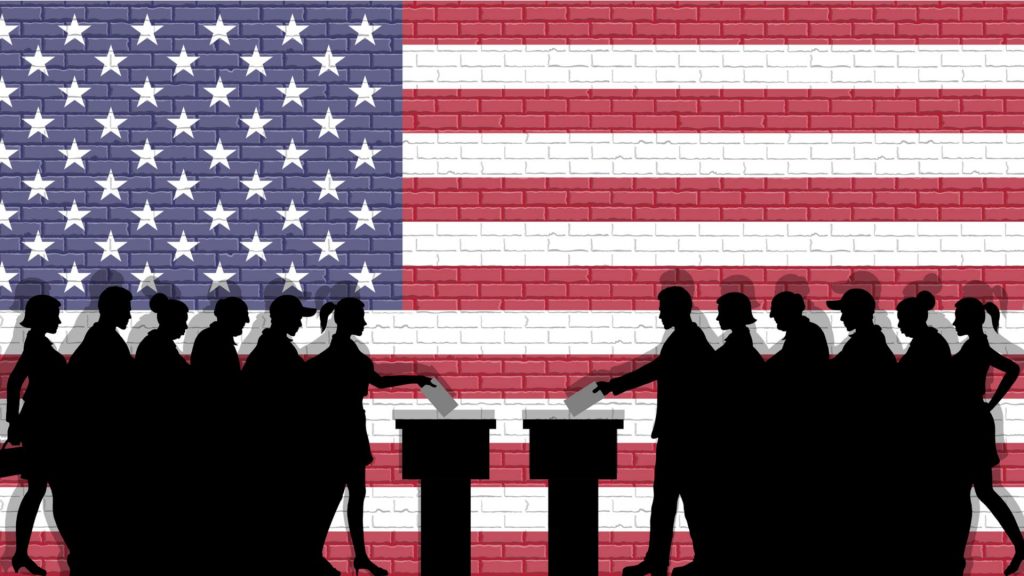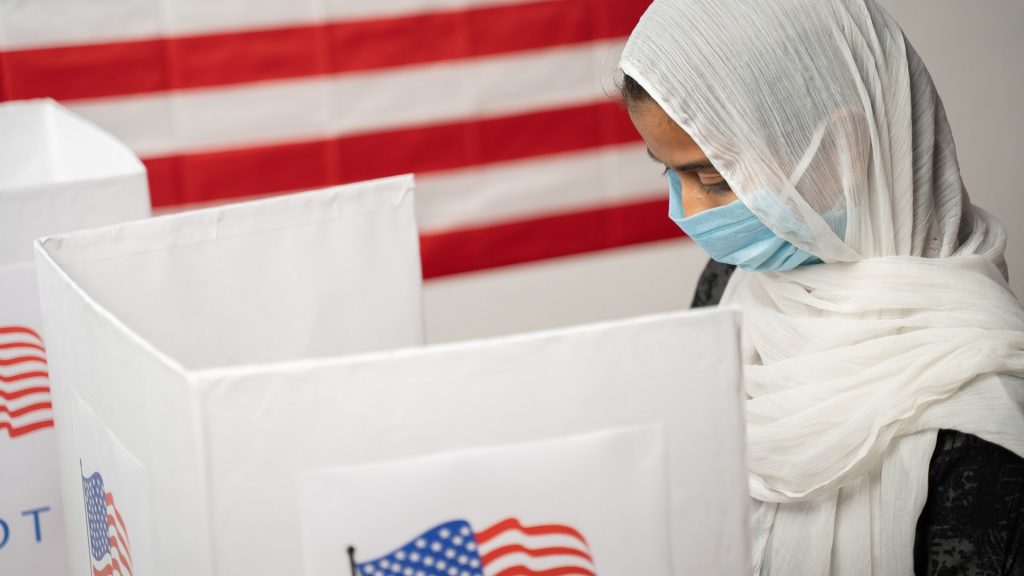“Your vote is your voice. Muslim American voices matter,” Joe Biden said at the Emgage Action’s online summit called “Million Muslim Votes” back in July 2020.
The presidential candidate’s comments reflect his real need for the Muslim vote, especially that there are sizable Muslim communities in the swing states of Florida, Georgia, Michigan and Pennsylvania.
Yet are Muslims a mere passive voting power? What kind of political leadership, if any, do they play on the state and national levels? and how has this political role developed overtime?
Studies and polls indicate with no doubt that the political engagement of American Muslims has been rising steadily over time on different levels.
An ISPU survey conducted in March 2020 found that 79% of eligible Muslim voters are registered to vote compared to only 61% in 2016, and 81% of those registered are planning to vote. It is important to note that 26% of American Muslims are not citizens, which makes them ineligible to vote.
Away from voting, it seems that American Muslims are more politically engaged on the local level than other Americans. 22% of Muslims report attending a town hall meeting in the year prior to the survey, compared to 15% of the general public. 16% of Muslims, a percentage very close to Jews, are the most likely to volunteer for a political campaign compared to only 7% of the American general public.
When it comes to the recent anti-racism activism wave, 65% of Muslims favor building alliances with Black Lives Matter (BLM); this is the highest among all faith groups surveyed, while 44% of the general public are in favor.

Identity Maturity
As Dr. Zahid Bukhari put it, “before 9/11, the majority of the immigrant US Muslim community were living here [in the US] physically, but mentally and spiritually they used to live back home.” This promising political engagement is fairly recent. When looking at the American Muslim community before 9/11 it would be fairly noticeable the high number of first-generation immigrants. Generally speaking, immigrants tend to be more concerned about their wellbeing and take long time to assimilate.
The process of assimilation can go in two different directions: the immigrant totally loses their identity and adopts that of the hosting community, leading to the second generation give up Islam; or the Muslim immigrant and their offspring find a way to keep their religious identity and still adopt the American identity.
The American Muslim community went through those phases. Witnessing Muslims running for public offices means that not only are they able to live with both identities but found that Muslims have something to contribute to America.
Voting in elections isn’t a big of an identity test, yet running for office is the prime test.
While it is hard to find one list of all Muslims holding public office in the US, I spent some time collecting names off news and states’ websites. The following examples are of the ones who actually won the elections to the public office. It means that there are a much bigger number of Muslims who pushed hard to serve America yet failed to get elected.
The following names won elections during one of the toughest times to just exist as a Muslim in America.
US Congress
Ilhan Omar – of Somali origin — was elected in 2019 to replace Ellison as the US Representative for Minnesota’s 5th congressional district.Keith Ellison made history back in 2007 as the first Muslim to be elected to the US congress, yet he didn’t stop there. Ellison became Attorney General of Minnesota in 2019.
Rashida Talib – of Palestinian origin – is the other Muslim woman in Congress. They both joined André Carson – African American – who has been in Congress since 2008 to represent Indiana’s 7th congressional district.

Muslim Mayors
Down from the national to the state level, there are at least two Muslim mayors serving American cities now. Sadaf Jaffer – 37 years old – is the first female Muslim mayor in America. She is serving the city of Montgomery, New Jersey, and was elected to office in 2019. Mayor Jaffer was born in Chicago to a Pakistan-born mother and a Yemen-born father.
Sumbul Siddiqui is another female Muslim mayor elected this year to serve Cambridge, Massachusetts. Mayor Siddiqui was born in Pakistan and immigrated to the US with her parents at the age of two.
Yet, the first Muslim mayor in American history was elected back in 1991. Charles Bilal was the first black mayor of the – back then – 70% white city of the Kountze, Texas.
State General Assembly
Following are some of the Muslims elected to a state general assembly: At least 10 Muslims are serving/served in their state’s house of representatives or senate. Yusuf Salaam might be the first Muslim to be elected to a state house of representatives in America. Between 2002 and 2010, Rep. Salaam served in Alabama’s legislative body.
- Abdullah Hammoud: Member of the House of Representatives, Michigan (2017-)
- Ako Abdul-Samad: Member of the House of Representatives, Iowa (2007-)
- Hodan Hassan: Member of the House of Representatives, Minnesota (2018-)
- Christopher Benjamin: Member of the House of Representatives, Florida (2020-)
- Ibraheem S. Samirah: Member of the House of Representatives, Virginia (2019-)
- Iman Jodeh: Member of the House of Representatives, Colorado (2020-)
- Jamilah Nasheed: Member of the House of Representatives, Missouri (2007-2013); Member of the State Senate, Missouri (2013-)
- Madinah Wilson-Anton: Member of the House of Representatives, Delaware (2020-)
- Mauree Turner: Member of the House of Representatives, Oklahoma (2020-)
- Mohamud Noor: Member of the House of Representatives, Minnesota (2018-)
- Movita Johnson-Harrell: Member of the House of Representatives, Pennsylvania (2009)
- Sam Rasoul: Member of the House of Representatives, Virginia (2014-)
- Samba Baldeh: Member of the House of Representatives, Wisconsin (2020-)
- Sheikh Rahman: Member of the State Senate, Georgia (2019-)
- Yusuf Salaam: Member of the House of Representatives, Alabama (2002-2010)
Other elected offices:
- Nida Allam: Member of Durham County’s Board of Commissioners, North Carolina (2020-)
- Shereef Elnahal: Commissioner of the Department of Health, New Jersey (2018-2019)
When it comes to the city level, there seems to be an endless list of Muslims serving on city councils. Yet the first Muslim-majority city council in the US is that of Hamtramck, Michigan.
Wise Muslim Leadership
America is passing through a very delicate phase of its recent history. Polarization doesn’t seem to fade away any time soon; on the contrary, it might be just the beginning. This is the time where Muslims are expected to, and they surely are, show what can Muslims brings to America.
One key feature of identity maturity is to be able to understand Islam as a proactive way to improve the lives of people. Long gone should the days be where American Muslims are only concerned about defending themselves against media accusations of terrorism.
Not only that “Muslim American voices matter,” but their actions should also matter.


No comments:
Post a Comment